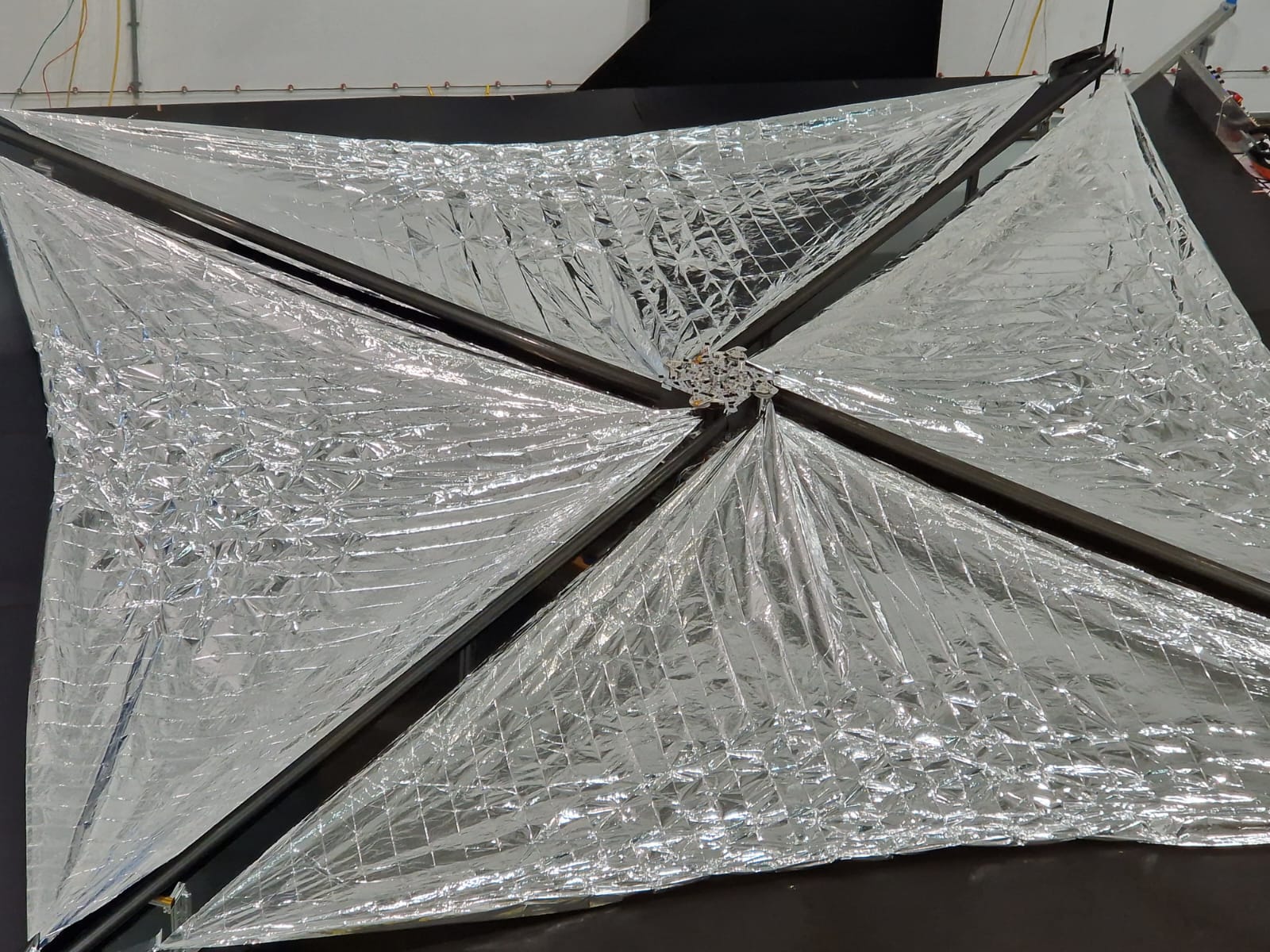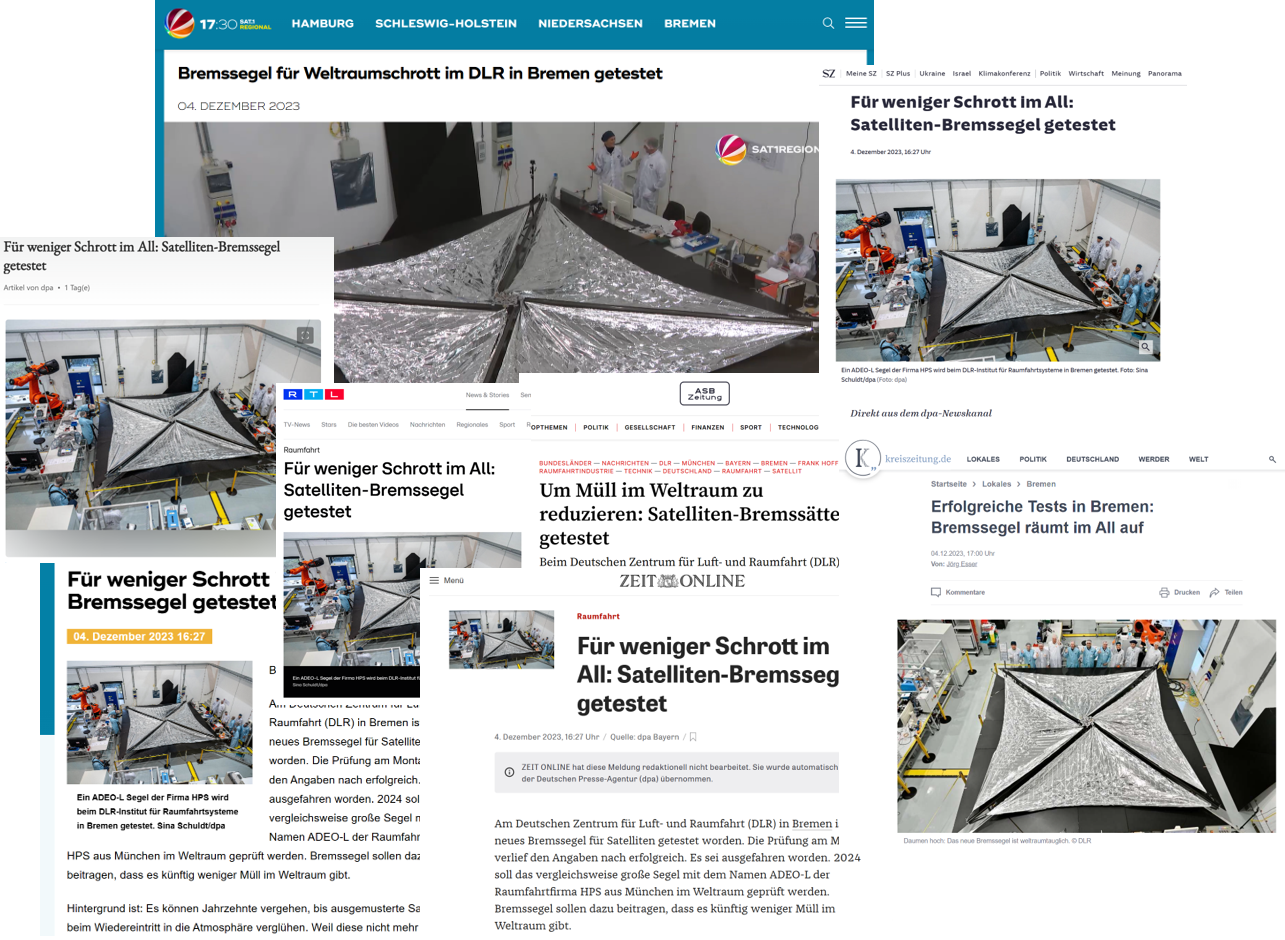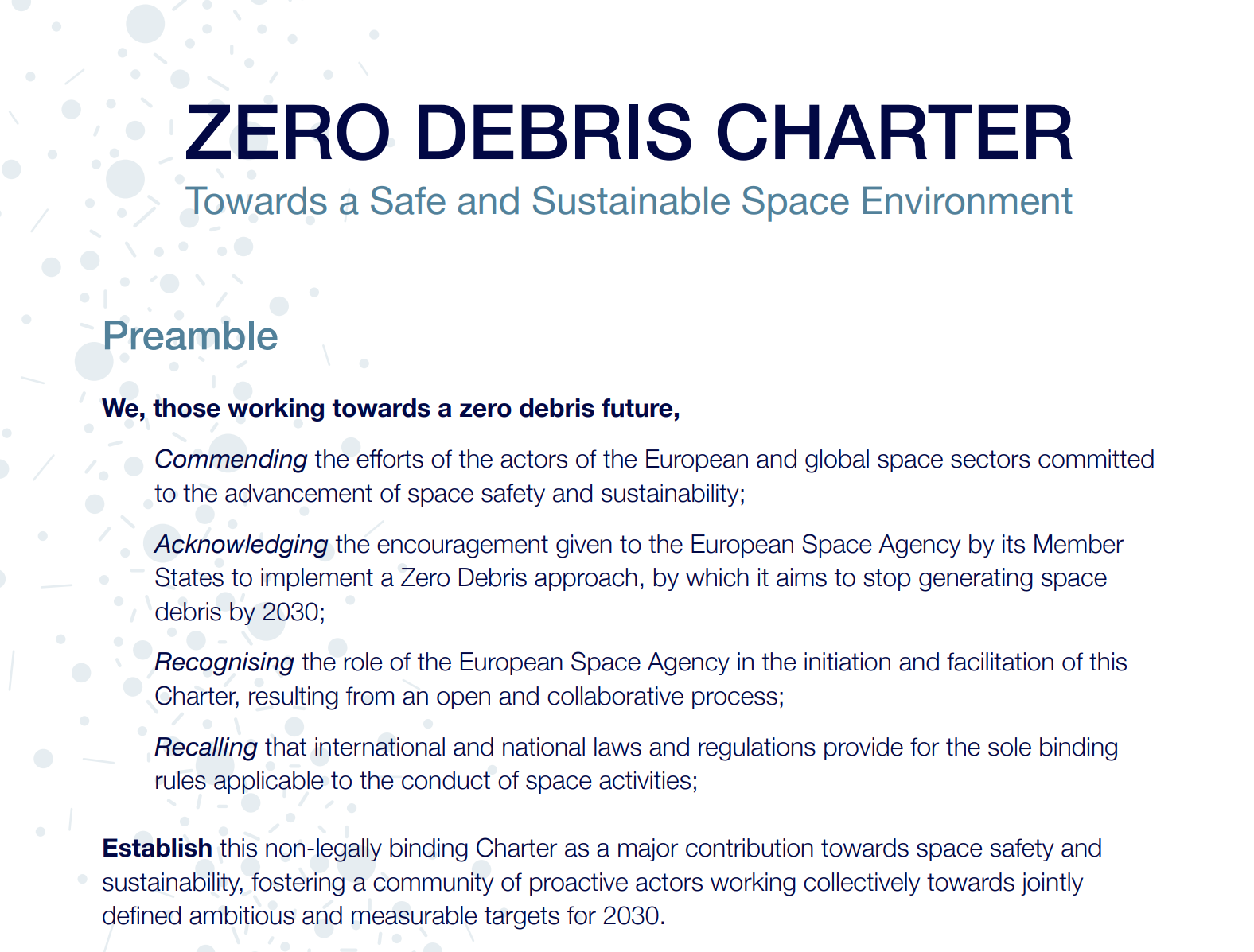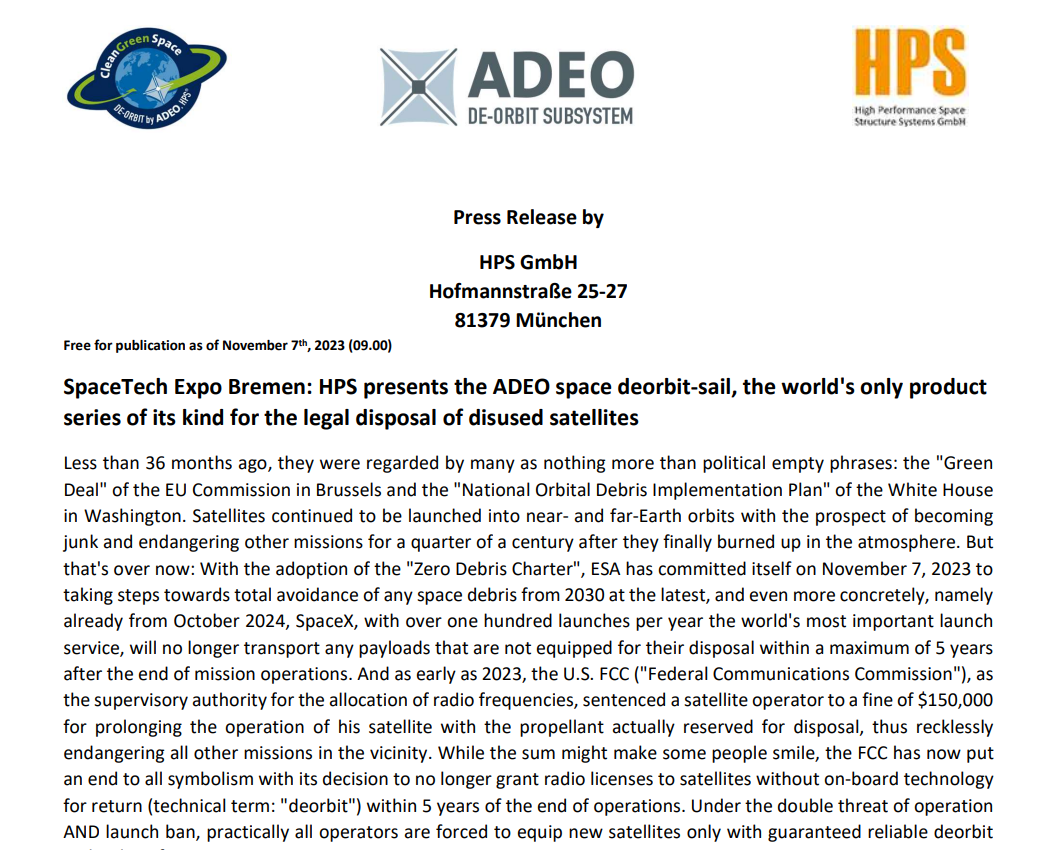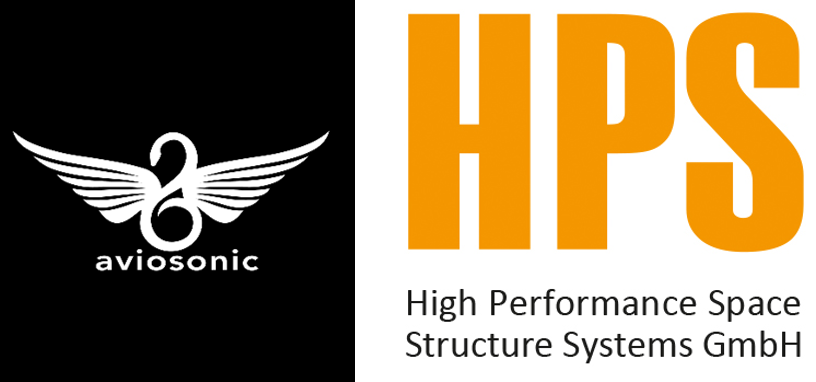September 2024
ADEO Pico: The smallest dragsail gains a foothold in the largest market
Deorbit Technology from HPS
With the ink now drying under the contract for a PICO-class satellite deorbit device from the ADEO dragsail family of HPS, the Munich-based space technology company is now also setting foot on North American soil: After careful consideration of the alternatives, the Canadian company StarSpec Technologies decided in favor of the system for integration on their InspireSAT 12U ADCS MVP satellite, to be launched in 2026.
The ADEO-P was purchased at the beginning of July. The integration will be carried out by the experts in 2025. The satellite is planned to be launched in 2026 aboard a Falcon9 as part of the Transporter-17 SmallSat Rideshire mission from the Vandenburg Space Force Base in the USA. At the end of the mission, the dragsail will be deployed to a size of 1.4 m2 and automatically dispose of the satellite within the now obligatory period of less than five years. The satellite will burn up in the atmosphere without leaving any residue.
This initiative promotes StarSpec’s high precision space-qualified ADCS components, including sub-arcsecond precision star cameras, cogless reaction wheels, and ultra-high-bandwidth controllers, providing 100x the precision and imaging quality for LEO imaging satellite.
Jason Brown, Mechanical & Technology Lead, commented on the key factors leading to the selection of the ADEO-P for InspireSAT: “A primary mandate of InspireSAT is to provide high performance in-orbit capabilities in a way that does not compromise and strongly maintains the continued and future utility of LEO. We are delighted to have HPS, a proven high-tech specialist in the international space industry, at our side, allowing StarSpec Technologies to maintain its sustainable and orbit-conscious approach to space in a way that maintains focus on the successful demonstration of our transformative state-of-the-art ADCS. Thanks HPS!”
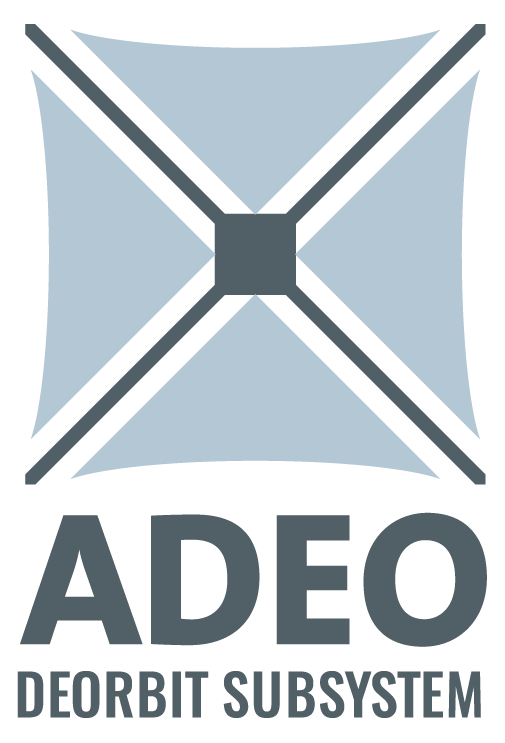
August 2024
ESA: 1 million for product innovation by HPS, AAC and DLR
ESA’s GSTP program is one of the European Space Agency’s most important instruments for promoting new technologies, particularly those generated by SMEs. The program also enjoys high priority in the overall ESA portfolio at the German space agency; the corresponding financial resources now also enable the launch of a new sub-program called “Product Initiative”. With the signing of the contract on August 7, 2024, ESA and HPS as the main contractor gave the go-ahead for the first technology project in this category.
It took just over six months from the idea to the signing of the contract; the funding amount is one million euros. The Munich-based space technology company HPS and its long-standing partner, Vienna-based Aerospace & Advanced Composites GmbH, are contributing 20 percent of their own funds, while the DLR Institute of Space Systems in Bremen is also on board on the research side. Over the next 24 months, highly innovative films (working name “ProFilm”) will be developed in various thicknesses and surface configurations and for large-area applications, which are characterized by two special features in particular:
- they are resistant to the chemically aggressive residual oxygen molecules (ATOX-resistant) and are therefore perfectly suited for use in particular in the highly frequented low earth orbit LEO area,
- Special derivatives are invisible or non-reflective.
In addition to use as thermal insulation for satellites, this also results in innovative applications as invisible brake sails as a further development of the HPS ADEO product range for deorbiting decommissioned satellites.
In this way, they serve four strategic goals of European space:
- Securing technological independence from other major spacefaring nations that have already made progress in this area
- Support European manufacturers of spacecraft and satellites, for whom maximum physical protection is an element of the competitiveness of their products
- Avoidance of astronomy-hostile light pollution in space through non-reflective surfaces on dragsails and thermal insulation such as MLIs and SLIs. There are also plans to use them for solar panels and radiators.
The ideas go as far as deployable structures that could make entire satellites invisible with ProFilm.
HPS CEO Ernst K. Pfeiffer is enthusiastic about the start of the project: “The innovation processes that have now been initiated will result in highly exciting products – the cooperation with our partners, DLR in the north and AAC GmbH in the south, alone is a guarantee of this. Above all, however, this premiere of ESA’s new GSTP sub-programme shows how quickly and effectively the European space agency can identify, accept and master technical challenges. This is exactly what European space travel needs, and this is exactly what innovation drivers from the ranks of SMEs need in particular.”
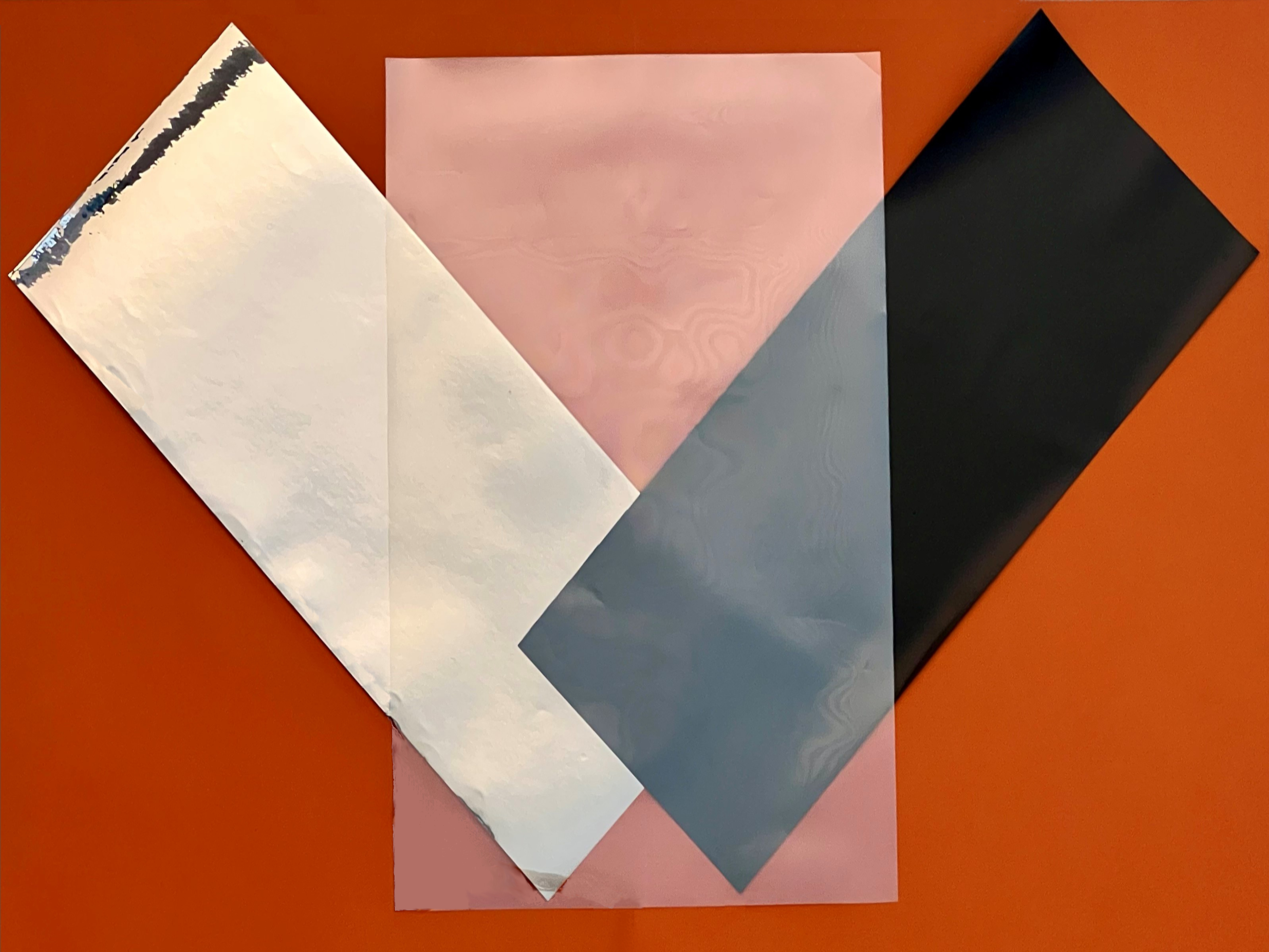
July 2024
Family & Friends Team Event at HPS Munich
HPS celebrates “Family & Friends”: July 10, 2024 is a special date – we celebrated with the entire HPS workforce and their families and all those many friends of our company according to the motto: Shared joy is double the joy.
Because we at HPS have many reasons to be happy: Since July 1, 2024, our HPS family has grown to a new record level with a total of 93 employees (including 11 freelancers and students) at the Bucharest (HPS Romania), Münchberg (HPtex) and Munich (HPS HQ) locations, and in Munich we have just expanded with a new, large floor in Hofmannstrasse as well as a large assembly area in the basement.
The circle of our friends from joint projects and association activities is huge, many from the Munich area came to visit us today, we were overwhelmed by the large number of surprise guests. Success is best celebrated with “Family & Friends”!
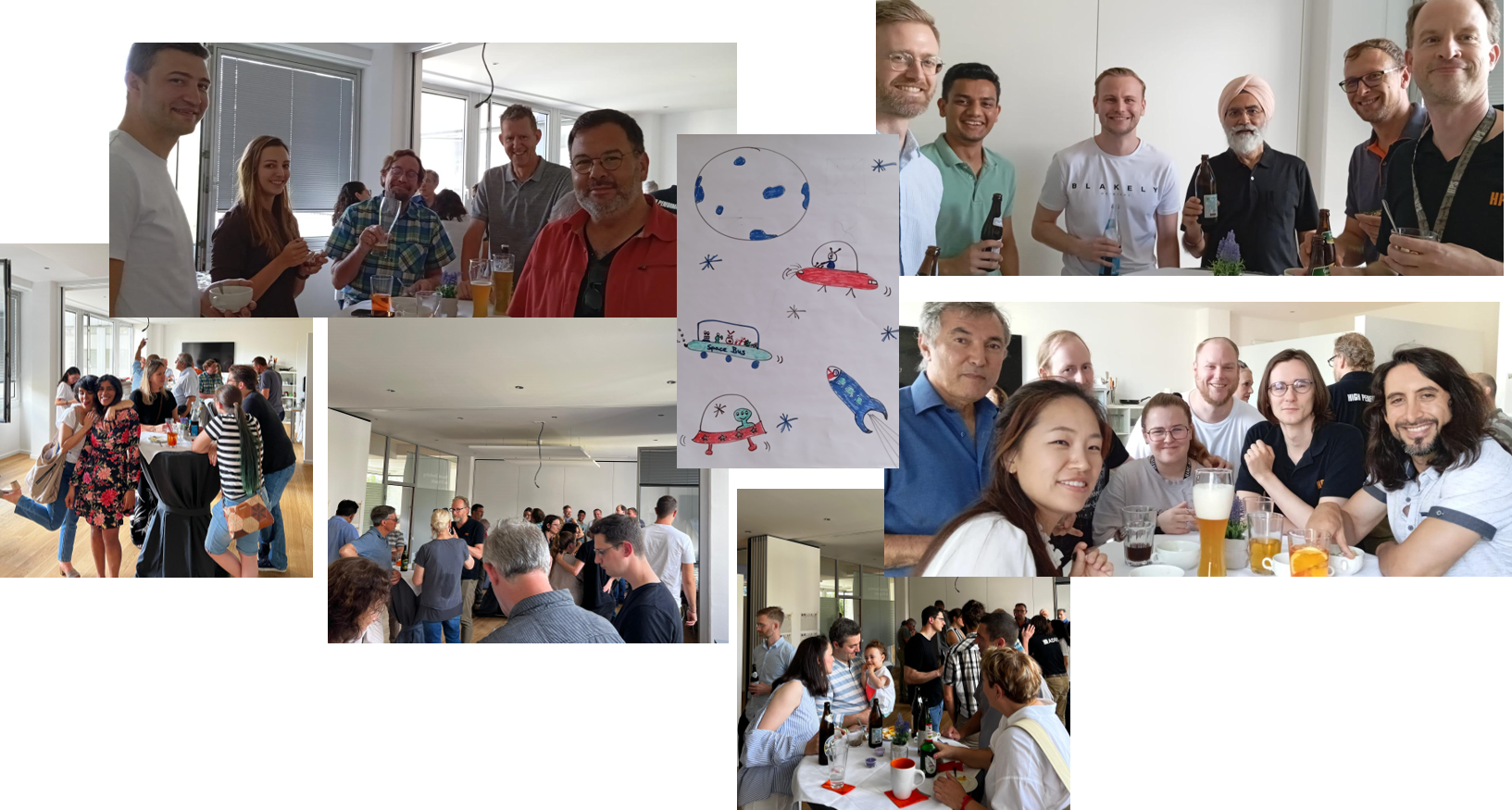
HPS Signing of the Zero Debris Charter at ILA on June 6, 2024
June 2024
ESA Leads the Way: Rapid Implementation of the Zero Debris Charter
Sustainability in space travel has also been an issue for the European Space Agency ESA for years. However, only a few months passed between the decision to adopt a Zero Debris Charter and its implementation.
Keynote speaker ESA Director General Josef Aschbacher also saw this as a sign that the time is finally ripe for concrete steps instead of pure symbolism, especially as ESA itself has provided significant impetus for the development of the two main technologies on the way to “Zero Debris”: firstly, ways of removing scrap from space, but above all, equipping satellites with deorbit technology from the outset so that no more waste is produced after the end of the mission.
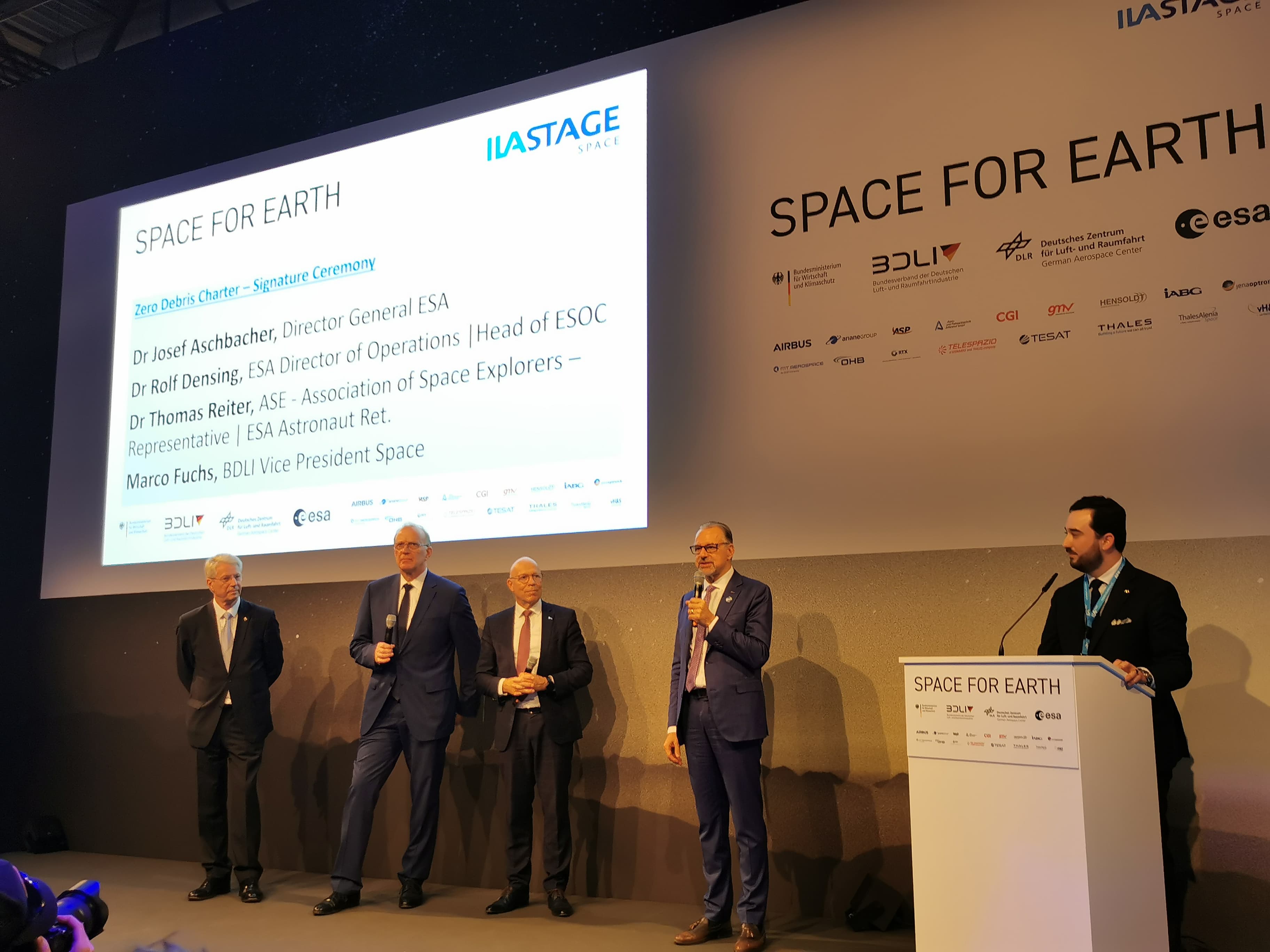
ADEO Drag Sail: The Key to Sustainable Spaceflight
The ADEO brake sail, which is now available as an entire product family for all sizes of LEO satellites from HPS series production, stands for this. In addition to grants and support from ESA, DLR and Bavaria, HPS CEO Ernst K. Pfeiffer also invested a lot of the company’s own money in the project, always firmly convinced that the hour of ADEO would come sooner or later – and if a little later, then all the more powerfully.
It was exactly the same when, in mid-2023, the ESA set the new rule of a deorbit maximum of 5 years for ESA-funded missions instead of the previous 25 years, and, accordingly, LEO satellites without ADEO (or similar) will no longer be launched at all from October 2024, as SpaceX, for example, makes clear in its conditions of carriage in accordance with FCC regulations.
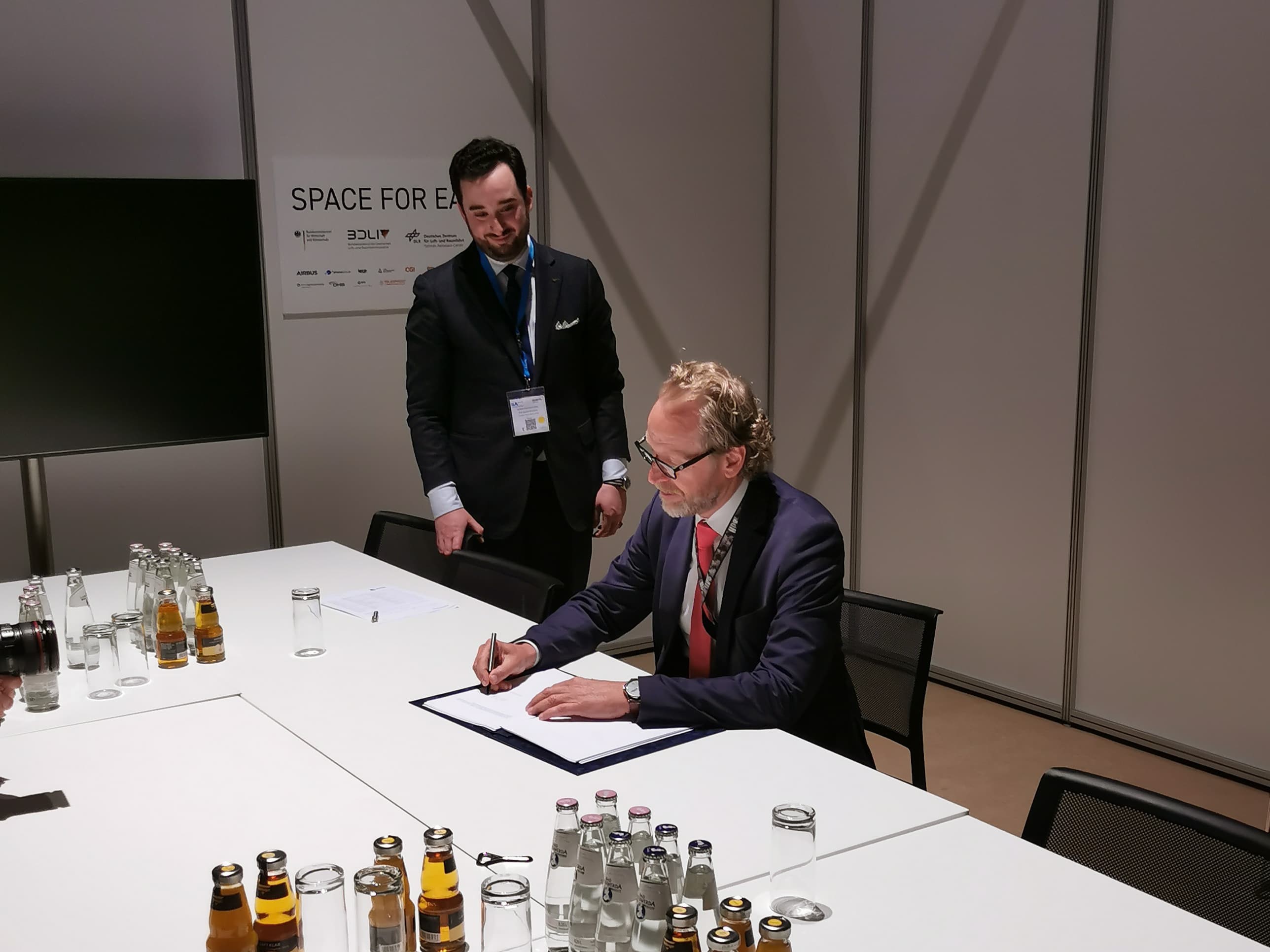
Historic Moment: 12 Nations Sign the Zero Debris Charter
The Charter was signed in Brussels on May 22 by 12 countries, including Germany. Since then, over 100 organizations, companies and entrepreneurs have been waiting for their cue to sign.
The ILA 2024 marks a very important stage on this path towards the sustainability of European space travel and sets an example for companies on other continents.
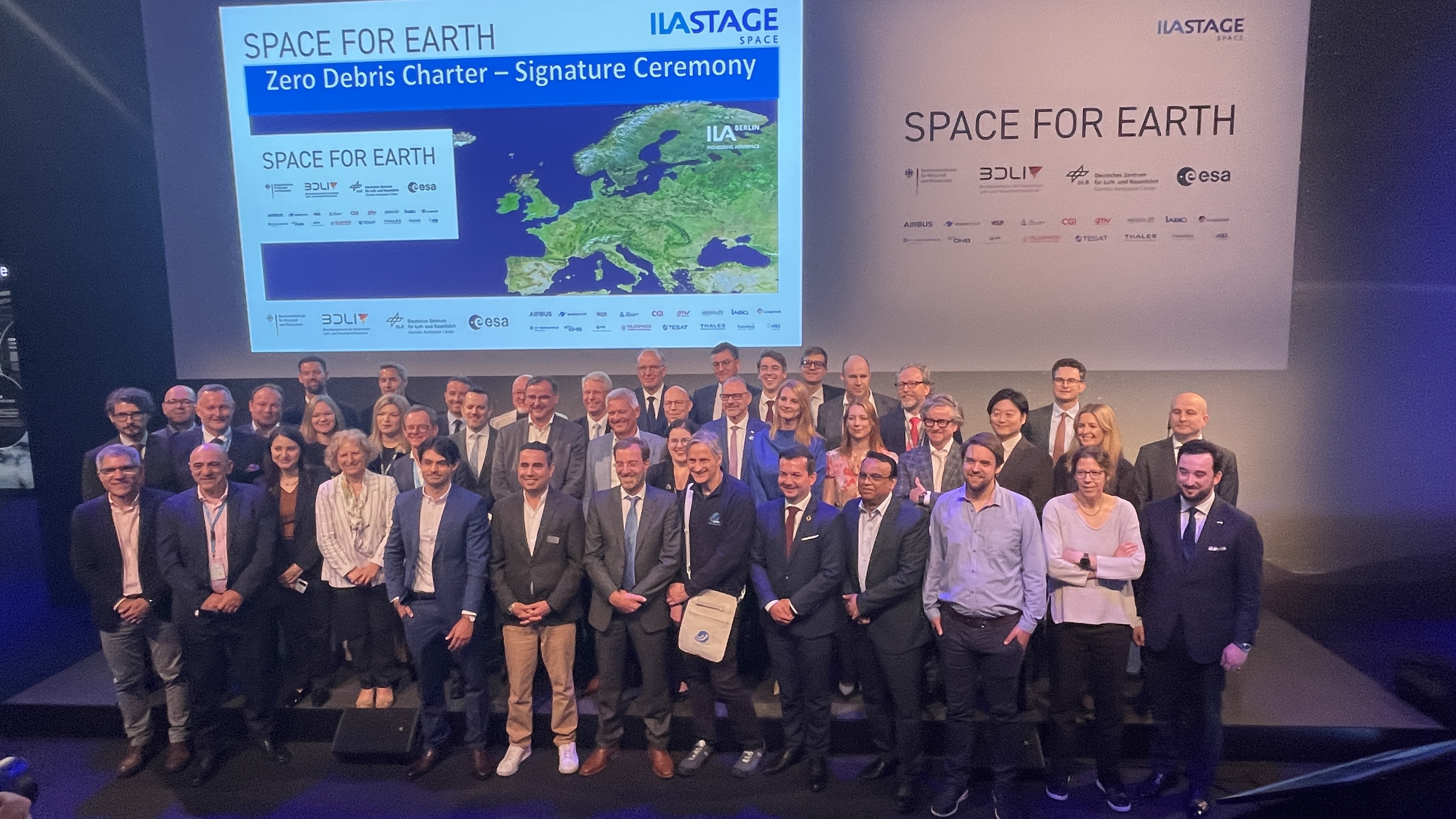
ADEO L1 “ready for lift-off”: World’s largest operational brake sail for the disposal of space debris successfully tested
Dezember 2023
ADEO L1 “ready for lift-off”: World’s largest operational brake sail for the disposal of space debris successfully tested
HPS completes the ADEO sail fleet with its first largest version under the version named L1. Its 25 square meters of sail area unfolded successfully deployed on Monday, 4th of December 2023 in a final ground test after a complete completed PFM qualification campaign. This included vibration tests in all axes as well as tests under thermal vacuum, including hot and cold firing tests (tests to verify the deployment release mechanisms under extreme temperatures). The tests were carried out under responsibility of HPS Munich at the facilities of the DLR Institute of Space Systems in Bremen – a prime example of cooperation between industry and research & development. This final and most important test enjoyed great interest from the media (including SAT1, RTL, NTV, DPA) covering the 20-minute deflation process and interviewing the enthusiastic project team of HPS and DLR. Links to the articles and television videos can be found HERE.
This test is also a success of ESA’s GSTP program, which significantly supported the development of ADEO-L1 financially and technically. Technology programs in general are essential for independent SMEs in the space industry and their products on the way to market readiness and worldwide series sales.
The ADEO brake sails deploy after the end of the satellite’s mission and brace themselves against the resistance of the atmosphere that still prevails in orbits up to an altitude of just under one thousand kilometers. This deployment immediately leads to a drastic reduction of the speed of the satellite and the entire package sets off on its accelerated descent towards the earth’s atmosphere, where it then burns up in the frictional heat of up to two thousand degrees Celsius. The entire return process takes even significantly less time than the latest guidelines prescribe. Until recently, the process could take up to twenty-five years, while it must now be completed within five years. And, to ensure that operators follow the rules, launch service providers such as SpaceX no longer even take satellites into space if they are not equipped with the appropriate return technology from the outset.
The Munich-based space-tech company HPS had this development in mind more than ten years ago, when no one else was really thinking about ways to avoid space debris. With great support from the space agencies ESA and DLR, the DLR institutes in Bremen and Braunschweig, the companies DSI, Bremen, and formerly HTS, Coswig, plus a seven-digit-investment of HPS, the company´s highly committed young team of experts has created an entire product family under the generic name ADEO, from the smallest versions ADEO-P (Pico), ADEO-C (Cube) and ADEO-N(Nano), ADEO-M (Medium) and the latest member of the group, ADEO-L (Large). The development master plan not only extends even further to possible ADEO variants with up to 100 square meters of braking surface, but also leaves enough room for derivatives with completely different applications, such as the monitoring of space debris smaller than1 cm directly in space.
In its largest flight-ready version to date, L1, ADEO has a take-off weight of 10 kg at dimensions of 43 cm x 43 cm x 25 cm; in contrast to the smaller versions, this unit also requires its own power supply for motor-controlled deployment of the masts and sails. ADEO-L1 generally fits perfectly on satellites up to the 1,500 kilo class.
In the first quarter of next year, ADEO-L1 will be integrated onto a satellite of the Belgian company Redwire for its first test flight at the end of 2024/beginning of 2025 as part of a EU program, while the versions ADEO-N1 and ADEO-N2 have already passed their baptism of fire in space. Approaching the fiery finale is currently ADEO-N2, deployed in December 2022. Since then, it has already lowered its satellite from an orbital altitude of 510 km to 460 kilometers in only 12 months without the aid of any fuel or attitude control. Expected “arrival” in a completely burnt-up state: mid2025 – and thus even around five times faster than without sails and twice as fast as prescribed.
ADEO-L1 will master this path of final in-orbit verification just as safely, company boss Dr.-Ing. Ernst K. Pfeiffer is certain. As with the other versions, it will then go straight into series production for which the company has special production facilities at its Munich and Bucharest sites.
HPS wins German government space competition with ADEO deorbit sail
November 2023
Space sails from the ADEO series enable legal launch and disposal of satellites
As part of the National Program for Space and Innovation and based on the decision of the Budget Committee in November 2022, the German Space Agency launched a competition for promising space innovations. The winner can expect a fully organized and financed demonstration flight with launch by 31.12.2025. On Thursday, 23 November 2023, the Federal Government’s Space Coordinator, Dr Anna Christmann, selected Munich-based space technology company HPS as the winner of the competition in the small satellite payload category with its ADEO-Cube space sail version at the 2023 Small Satellite Conference. The ADEO product family is designed as a series with different model types (Pico, Cube, Nano, Medium, Large), with which all satellites from the Cubesats to the larger representatives with 1.5 tons (class “M”) are automatically removed from low Earth orbit (LEO) and disposed of at the end of the mission. This so-called “deorbiting” with the ADEO braking sail not only fulfills, but even undercuts the maximum duration of 5 years that will apply from October 2024 instead of the 25-year guideline that has been in place since the 1960s. Quite simply, this means that no satellite will soon be accepted for launch without special on-board technology, such as the appropriate space sail from HPS’s ADEO series, if it cannot otherwise be legally disposed of. Since SpaceX, for example, as the leading launch service provider, will be introducing this rule from October 2024, it will apply to practically all future satellites, including those that are already in the design and manufacturing phase today.
As HPS CEO Ernst K.Pfeiffer, there is still only one alternative to ADEO, but it “is chemical, expensive and – in the case of a damaged satellite – inoperable”, the passionate aerospace engineer states about the market position of the ADEO space sail: “ADEO is currently the cheapest, most reliable and cleanest solution for legal deorbiting on the global market, available in all classes thanks to series production at HPS Bucharest and HPS Munich, and highly competitive in the hotly contested commercial market for satellite technology.We at HPS, especially our development team, are all very pleased that our sustainable technology has been recognized by the Small Satellite Competition at the highest level.”
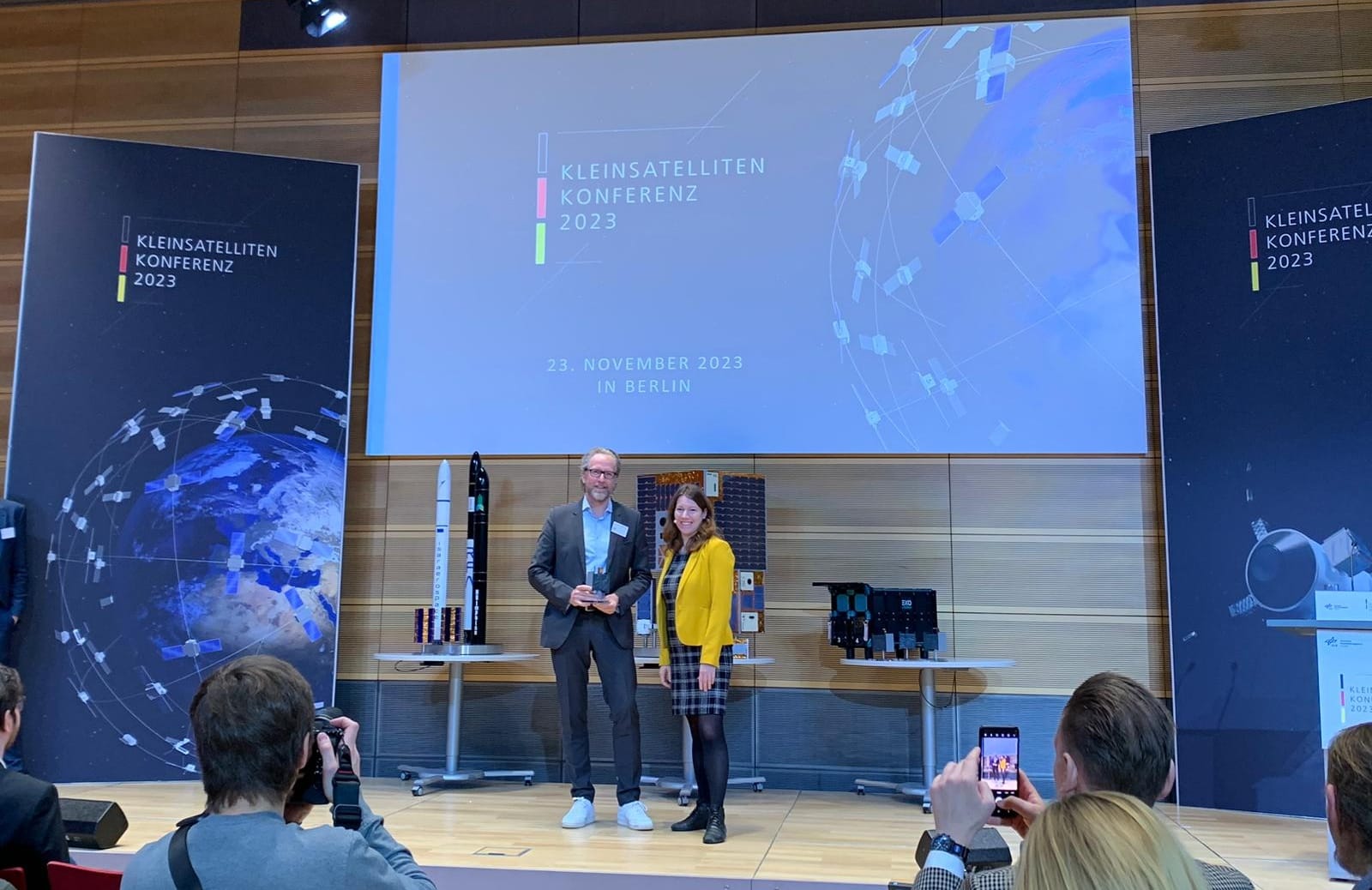
ESA´s “Zero Debris Charter” finalized – HPS among the first to sign
November 2023
ESA´s “Zero Debris Charter” finalized – HPS among the first to sign
Initiated by ESA´s office for “Strategy and Transformation” a considerable group of European space companies, including HPS, got together in order to jointly draft and now implement this continent´s set of rules for sustainable use of space. HPS is one of the first companies to sign the document on November 7th, 2023. Though legally non-binding, the “Zero Debris Charter” aims at putting an end to the inconsiderate and irresponsible pollution of space with tech-junk. In detail, the Charter clearly names the following targets:
- The probability of space debris generation through collisions and break-ups should remain below 1 in 1,000 per object during the entire orbital lifetime. A suitable aggregate probability threshold for constellations of satellites in the low Earth orbit region should be identified.
- Timely clearance of low Earth orbit and geostationary Earth orbit regions should be achieved with a probability of success of at least 99% after end of mission, including through external means when necessary.
- The casualty risk from re-entering objects should remain significantly lower than 1 in 10,000, striving towards zero casualty. A suitable aggregate risk threshold for constellations of satellites in the low Earth orbit region should be identified.
- Routine and transparent information sharing should be facilitated and active participation in strengthening global space traffic coordination mechanisms should be encouraged.
- Access to timely and accurate data on space objects down to a size of 5 cm or smaller in low Earth orbit and 20 cm or smaller in geostationary Earth orbit should be improved to enhance decision making capabilities for collision avoidance.*
Ernst K. Pfeiffer, CEO of HPS at the signature ceremony: “In our days now space is rapidly developing into the most important resource for the implementation of new technologies shaping our future on Earth. All efforts to preserve space from the beginning are therefore nothing less than efforts to preserve the fundamental conditions of life and its prosperity for humankind´s generations to come.”
*For more see:
*https://esoc.esa.int/zero-debris-community-update
*https://www.esa.int/Space_Safety/Clean_Space/World-first_Zero_Debris_Charter_goes_live
*https://www.esa.int/Space_Safety/Clean_Space/ESA_s_Zero_Debris_approach
*https://www.esa.int/Space_Safety/Clean_Space/The_Zero_Debris_Charter
HPS presents ADEO space deorbit-sail, the world’s only product series of its kind for the legal disposal of disused satellites
November 2023
SpaceTech Expo Bremen: HPS presents the ADEO space deorbit-sail, the world’s only product series of its kind for the legal disposal of disused satellites
Less than 36 months ago, they were regarded by many as nothing more than political empty phrases: the “Green Deal” of the EU Commission in Brussels and the “National Orbital Debris Implementation Plan” of the White House in Washington. Satellites continued to be launched into near- and far-Earth orbits with the prospect of becoming junk and endangering other missions for a quarter of a century after they finally burned up in the atmosphere. But that’s over now: With the adoption of the “Zero Debris Charter”, ESA has committed itself on November 7, 2023 to taking steps towards total avoidance of any space debris from 2030 at the latest, and even more concretely, namely already from October 2024, SpaceX, with over one hundred launches per year the world’s most important launch service, will no longer transport any payloads that are not equipped for their disposal within a maximum of 5 years after the end of mission operations. And as early as 2023, the U.S. FCC (“Federal Communications Commission”), as the supervisory authority for the allocation of radio frequencies, sentenced a satellite operator to a fine of $150,000 for prolonging the operation of his satellite with the propellant actually reserved for disposal, thus recklessly endangering all other missions in the vicinity. While the sum might make some people smile, the FCC has now put an end to all symbolism with its decision to no longer grant radio licenses to satellites without on-board technology for return (technical term: “deorbit”) within 5 years of the end of operations. Under the double threat of operation AND launch ban, practically all operators are forced to equip new satellites only with guaranteed reliable deorbit technology from now on.
This can be done with the on-board propulsion system using chemical propellants while shortening mission and profit, but even that does not work in case of satellite failure and is also comparatively expensive due to the need for constant control monitoring from the ground.
The alternative is called ADEO: from HPS (Munich and Bukarest) a space sail, self-deploying at the end of the mission, which automatically removes the satellite from space well below the specified deorbit times, is ideally suited as baseline-tech and emergency parachute. Already 36 million flight kilometers before the planned maneuver, the German specialist for orbit guidance and collision avoidance OKAPI:Orbits (Braunschweig) as a cooperation partner calculates the point for the descent without risk for other satellites. In addition, HPS partner number two, the Italian company AVIOSONIC, in constant liaison with the worldwide air traffic control stations, ensures via new ADEO-features highly accurate position conrol and spares aircrafts from hits by any satellite parts that may not have burned up.
The ADEO product family with officially attributed highest possible level of reliability (“TRL 9”) holds tailor-made solutions for all satellites from the tiny Pico- and Cube-Sat up to the 1.5 tonner and for all low-Earth orbits up to a distance of 900 kilometers from Earth. All ADEO lines are mass-produced by HPS, yet they feature adaptive design for special requirements that may arise from satellite design.
The prices of all ADEO models without exception are considerably lower than the expenditures required for deorbiting with chemically driven engines – apart from the fact that the safety of the deorbit of even these satellites – for example in the event of a system failure – can actually only be guaranteed by an ADEO system carried along as a backup.
For more detailed information on ADEO see: https://www.hps-gmbh.com/en/portfolio/adeo-angel-on-wings/
For the Sake of Safety and Sustainability in Space: OKAPI:Orbits´ AI now available as Assistance System to ADEO Deorbit Sail for Satellites
June 2023
Germany´s leading collision avoidance system reliably predicts the perfect slot for descent through tons of debris and space traffic.
When, after two, five or more years of operation, a satellite is supposed to leave its orbit and re-enter Earth, it’s a ride on the skyway to hell in two respects: first, for the satellite which is destined to burn up in the atmosphere, but also for other satellites as well as for an encounter with scrap parts that could hit it like unguided missiles – and produce even more junk. Satellites equipped with the ADEO braking sail from HPS are already in automatic descent mode. From now on, however, this can be upgraded by the Collision Avoidance system from industry-leading German startup OKAPI:Orbits. The company emerged as a spinoff from Braunschweig University of Technology in 2018 after over 40 years of intensive research. This Collision Avoidance System minimizes the collision risk during the de-orbit trajectory by figuring out the situation even ten days in advance. Appropriate maneuvers are also recommended for the satellite’s control system. This is made possible by the unique AI behind OKAPI:Orbits.
“Picture a distant view of 6.72 million kilometers of orbits on which about 10,000 satellites, 1,000,000 large and medium objects and 130,000,000 small ones exist that are not currently trackable. This is how complex computing operations is. Now, we should also take into account their velocity of 20,000 to 30,000 kilometers per hour. To any human sensibility, this is pure chaos, which the artificial intelligence behind our Collision Avoidance Software handles with aplomb,” says OKAPI’s company CEO Kristina Nikolaus.
Ernst K. Pfeiffer, CEO of HPS, a medium-sized innovation company, adds, “Our ADEO braking system not only performs the fastest possible passive descent even under adverse conditions – for example, when the satellite is already dead – it is also the deorbit solution with the largest safety reserve directly on board. Customers who don’t want to rely solely on their own software to control their satellites will find a unique safety architecture for the deorbit of almost all satellites with ADEO’s optional assistance systems for position tracking (Aviosonic) and optimal descent prediction (OKAPI:Orbits) at HPS.” ADEO is under discussion as a deorbit subsystem for the satellites of Europe’s coming constellation IRIS2 and “together with the features of Aviosonic and OKAPI:Orbits it levers the constellation to the most secure and sustainable one also after satellites’ nominal lifetime.”
During descent, the combination of all three technologies onboard the satellites will increase significantly the orbit determination and prediction, which is a unique advantage also for other satellites, constellations and stakeholders like owners, operators, and insurers.

MoU of Space SMEs Aviosonic and HPS to join forces fighting space debris – right in time for Europe´s new constellation Iris2
Mai 2022
Aviosonic´s patented DeCAS for tracking and re-entry footprint prediction extending high-tech-lead of Europe´s satellite deorbit system “ADEO” unassailably
(Munich-Milano, May 10th, 2023). At testified TRL-9 and with solid flight heritage the sail system “ADEO” already is the leading device for quickly deorbiting almost all satellites, thus preventing spacecrafts after their end of mission from becoming as well as producing new space junk for years to come. Because it is a sail, it does not produce any pollution itself, chemical or otherwise, and because this very sail will be in its next version also transparent and absolutely non-reflective, it does not cause any irritations to any space observer on earth. Munich based spacetech innovator HPS, a medium sized company with a subsidiary in Romania and a total headcount of 80, has invested – together with several institutional and industrial partners – 12 years of constant development and qualifying into ADEO, and is now ready to take yet another giant leap by joining innovative forces with Aviosonic Space Tech, Milan/Italy.
Aviosonic Space Tech, born in 2015, owns the patented DeCAS system (Debris Collision Alert System) for in-orbit/de-orbit tracking and re-entry footprint prediction of space vehicles. DeCAS is a 1U mm system which always maintains a constant link with the ground operation center allowing precise information on the satellite position, aliong with the calculation of the re-entry footprint in real time, with the aim of collision avoidance between satellites, satellites and aircrafts as well as to alert government agencies. The technical characteristics and modularity allow DeCAS to be installed on any space vehicle, offering different services depending on the mission requirements. DeCAS, which took part in different space missions, provides a unique service for satellite tracking, decommissioning and re-entry prediction in real-time.
Prof. Piermarco Martegani, CEO of Aviosonic Space Tech says:”The integration between DeCAS and ADEO allows the creation of a unique product on the market capable of strongly implementing the safety of space operations both during orbital and decommissioning re-entry phses, even in the event of failure of the hosting satellite. This safety information is also needed by the Air Traffic Management System. The collaboration between Aviosonic Space Tech and HPS is the demonstration that in order to guarantee safety during space operations, an international cooperation between SMEs is necessary.”
HPS-CEO Ernst K. Pfeiffer shows bulletproof confidence in the future of ADEO on the world market and emphasizes: “ADEO has all the facts on its side: first, all space industry badly needs a deorbit device like ADEO, since the faster the sail opens free orbit positions, the longer we can keep space as a sustainable surrounding. And, from second to infinite: ADEO combines TRL9 and flight heritage, offers a comprehensive range of models, beats economically as well as ecologically any other type of deorbit device, also it is already in serial production at HPS. And now we even join forces with the two outstanding innovators in their fields, and others will join, underlining once again what´s at the core of ADEO: 100 percent European, 100 percent SME, 100 percent sustainability in space – and exactly what Europe wants for Iris2.”
Contact for further information:
HPS: Dr. Daniel Stelzl, stelzl@hps-gmbh.com
Aviosonic: Prof. Piermarco Martegani, Piermarco.Martegani@aviosonic.it
ADEO Dossier: German: (https://www.hps-gmbh.com/tag/adeo/)
ADEO Dossier: English: (https://www.hps-gmbh.com/en/tag/adeo-en/)
Video: https://youtu.be/pUeSZzdn_6c

